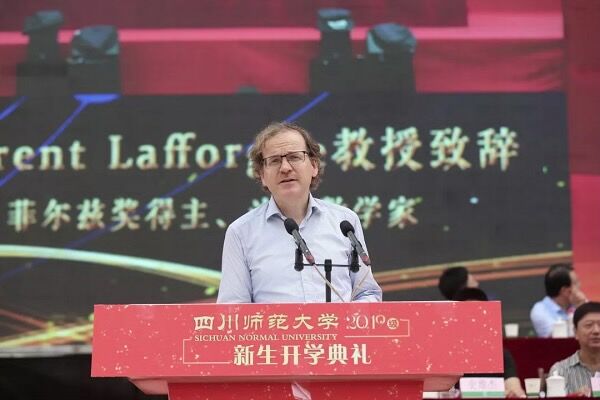

Dear Professors and Dear Young Students of Sichuan Normal University, it is an honor for me to be invited to speak for a few minutes before you.
亲爱的四川师范大学的老师们,同学们,承蒙贵校邀请,出席你们新生的开学典礼并发表简短的演讲,我深感荣幸!

It is also a big responsibility and a difficult task because entering university or starting a new year of study are particularly important moments.
对你们而言,进入大学开启了你们任重道远的人生旅程,开始新一年的学习也有着非凡的意义!
In reflecting on what I could say best to encourage you to study, I thought of a wonderful text by the French philosopher Simone Weil in which she seeks to identify the purpose and main interest of studies.
要用什么样的话语才能更好地激励你们学习,一番思考过后,我的脑海里便浮现出了法国哲学家西蒙娜·韦伊的一篇精彩文章,她在这篇文章中试图去阐释学习的目的和如何培养读书的兴趣。
Simone Weil was born in 1909 and died in 1943, at the age of 34, but left a very important work, very beautiful and very deep. In my opinion, she is one of the greatest European thinkers of the twentieth century.
西蒙娜·韦伊生于1909年,1943年去世。虽然享年34岁,,但她却留下了思想深刻而优美的重要作品。在我看来,她是二十世纪欧洲最伟大的思想家之一。
It turns out that her older brother André Weil, born in 1906 and died in 1998, is universally recognized as one of the greatest mathematicians of the twentieth century. His work has inspired many mathematicians, especially Alexander Grothendieck, who is perhaps the greatest mathematician of the twentieth century.
她的哥哥安德烈·韦伊生于1906年,1998年去世,也是公认的二十世纪最伟大的数学家之一。他的作品启发了很多数学家,尤其是亚历山大·格罗滕迪克,一位也许是二十世纪最伟大的数学家。
Simone Weil and his brother André Weil loved each other very much but had completely different personalities and ideas. Similarly, Alexander Grothendieck knew Andre Weil well but was completely different from him both as a man and as a mathematician. On the other hand, Grothendieck never knew Simone Weil and probably never read his writings but, surprisingly, his thought has much in common with that of Simone Weil.
西蒙娜·韦伊和她的哥哥安德烈·韦伊互敬互爱,但不论从性格上还是思想上来看,两人却有着极大的不同。巧的是,亚历山大·格罗滕迪克和安德烈·韦伊相知相识,但不论从男人还是数学家的角度来说,两人也极为不同。令人惊奇的是,亚历山大·格罗滕迪克不认识西蒙娜·韦伊,甚至从未拜读过她的作品,但两人的作品却有着许多相似之处。
I would like to speak to you today about attention, which is a central theme both in Simone Weil's thinking and in Grothendieck's mathematical research work.
今天我想和大家讨论的是专注度,这是西蒙娜·韦伊思考方式和格罗滕迪克数学研究工作中所呈现出来的重要主题。
The formation of the faculty of attention is, according to Simone Weil, the true goal of studies.
在西蒙娜·韦伊看来,专注度的养成才是学习的真正目标。
The field we are working on, the subject of exercises, problems or essays are of secondary importance. The most important thing is to study with attention, with care.
我们所研究的领域,探讨的课题,遇到的问题,撰写的论文,所有这些,都是次要的。做重要的是全心全意投入到学习中去,体现你们的专注度。
Any field carefully studied, any exercise or problem on which one concentrates one's attention, any subject of writing which one treats with attention, increases the faculty of attention. Then this faculty of attention becomes larger and finer, and can be found not only in any other type of study but also in all life. We learn to pay attention to any beautiful thing we are given and we also learn to pay attention to other people.
任何领域,只要你仔细研究;任何课题中所遇到的问题,只要你全神贯注;任何需要撰写的论文,只要你全身心投入,都能提升你的专注度。之后,这种专注度会不会断强化,这不仅可以在其他相关学习中得以体现,甚至会融会贯通于生活中。我们既要关注所见的一切美妙事物,也要学着关注他人。
Even if a field of study is more painful for us, even if we try to solve exercises or problems which are very difficult for us, these are all the more favorable opportunities to cultivate our faculty of attention.
即使某些研究领域会让我们更加痛苦,即使有些问题会让我们感到难上加难,但这些都不失为培养我们专注度的极佳机会。
An effort of attention is never lost. Its fruits are found in all our life.
永远不要停止为培养专注度所做的努力,因为专注度会使我们的生活结出累累硕果。
To give attention is made possible by trust. Trust that if we seek the truth, or even a small truth, our search will not be in vain, will not be lost, and we will indeed find an answer to our quest for truth.
在信任的基础上对别的事物给予关注才是可行的。相信如果我们探寻真理,或者哪怕是一个小小的真相,我们的这种探索不会是徒劳无益的,也不会是销声匿迹的,在追寻真理的过程中就一定会找到答案。
Two conditions are necessary, writes Simone Weil, for studies to produce a good effect in us.
西蒙娜·韦伊写道,要学而有成,必须满足两个条件。
The first is to desire the light, to desire the truth.
第一个条件是追寻光明,渴求真理。
The second is to accept to face our errors and inadequacies: to understand all the mistakes made, all the corrections of the teachers.
第二个是要直面自身的错误与不足:要明白自身所犯的种种错误,更要理解老师们为你们所做的答疑解惑。
To fulfill this second condition, it is enough to want it.
要实现这第二个条件,你们必须严于律己。
On the other hand, the first condition - which is the desire for light - is not obtained by an exercise of will. Indeed, attention is something other than an act of will.
从另一个层面来说,第一个条件——追寻光明——并不是靠主观意志就可以达到的。事实上,专注度不是你想得到就能得到的。
Attention is an effort but it is a negative effort: it consists in suspending one's will and even one's thought to make oneself receptive, open to the light, available to the truth.
专注度的培养是需要付出的,但这种付出会让你产生负面的情绪,包括压制自我欲望,甚至是抛弃自我思想,然后才能使自己广纳百川,心向光明,笃信真理。
In particular, attention forbids precipitation. It consists in waiting for the truth with desire, without even allowing oneself to look for it.
特别需要指出的是,专注度的养成容不得任何急躁的行为。这需要怀着渴求的态度等待真理的出现,主动找寻反而显得弄巧成拙。
Attention to other people, writes Simone Weil, has exactly the same substance as attention to intellectual truths.
西蒙娜·韦伊写道,关注他人和专注知识上的真理有着完全相同的实质。
One of the most important tales of the French and European Middle Ages, the "legend of the Grail", centers on a precious stone, the "Grail", which has the power to satiate any hunger. But this precious stone will belong to the one who will say first to the stone keeper, a king paralyzed by the most painful wound: "What is your torment?"
在欧洲——尤其是法国中世纪广为流传的一个传说——“圣杯传说”,主要讲述了一块被世人称作”圣杯”的宝石,拥有消除一切饥饿的魔力,但宝石只能属于一人,他必须先询问那位宝石的守护者,一位受到最惨重的伤害而瘫痪不起的国王:“你到底是经历了怎样的磨难啊?”
The fullness of attention to another person is simply to be able to ask, "What is your torment?"
对他人高度的关注就是能够简单地询问:“你到底是经历了怎样的磨难啊?”
Thus, Simone Weil does not call to seek and even less to invent or to manufacture, she calls to wait, to listen, to see, to be receptive.
因此,西蒙娜·韦伊所提倡的并不是要你去探寻,甚至也不是要你去搞发明创造,她所提倡的是要你去等待,去倾听,去观察,去接纳。
Surprisingly, Alexander Grothendieck, who many consider the greatest mathematician of the twentieth century, speaks of his mathematical research exactly with the same words. He left a gigantic work, thousands and thousands of pages of new mathematics, and yet he speaks of mathematical creativity as if it consisted only of being receptive, listening to the voice of mathematical things, seeing, and writing what these things tell us.
让人啧啧称奇的是,被很多人认为是二十世纪最伟大的数学家的亚历山大·格罗滕迪克,他也用完全一样的话语谈到了自己的数学研究。他留下了长篇宏制的巨作,也就是成千上万页关于新数学的想法。然而当他谈到数学创造力的时候,就好像是只包括了接纳数学新事物,倾听数学领域的万物之声,观察和记录下所有这些事物想要传达给我们的一切。
In conclusion, I hope that these enlightning words by Simone Weil and Alexander Grothendieck's experience can help to understand what gives university studies their greatest and most profound meaning. Now, if one does something by understanding its profound meaning, one does it with happiness and joy.
总而言之,我希望西蒙娜·韦伊和亚历山大·格罗滕迪克的经历可以帮助你们更好地理解那些赋予大学学习伟大而深远意义的事物。如果一个人能够通过理解它的深刻含义来完成这件事情,那么他就会带着极大的幸福和快乐去做。
外国语学院冯四文 译
编辑:杨俊